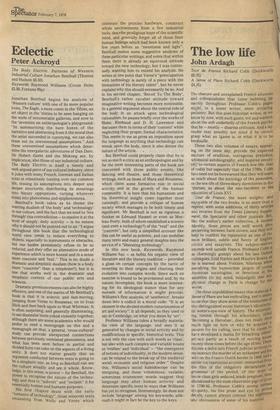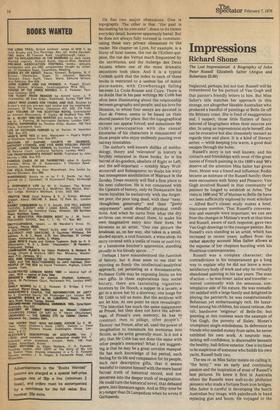The low life
John Ardagh
Tour de France Richard Cobb (Duckworth £6.95) A Sense of Place Richard Cobb (Duckworth £4.95) The obscure and unexplained French allusions and colloquialisms that come bubbling up merrily throughout Professor Cobb's pages might, in a lesser writer, seem irritating pedantry. But this poet-historian writes, as we know by now, with such gusto, wit and warmth about the soft underbelly of the French psyche that he — mostly — disarms criticism. And a lay reader may possibly not mind if he canne.t. grasp what an Igame is, or what it is to be bredouille.
• These two slim volumes of essays, appearing on the same day, provide the expected mixture of erudition, outrageous prejudice, whimsical autobiography, and inspired sensitivity to certain aspects of French low-life, that of today but especially that of the 1790s. Cobb fans need not be forewarned that they will learn as much about the sociology of the pissotiere, or the sex-life of Shrewsbury dormitories in the 'thirties, as about the neo-Jacobins or the education of Louis XVI.
Tour de France, the more weighty and enjoyable of the two books, is no more than a reprint, with some additions, of thirty articles and reviews from the Times Literary Supplement, the Spectator and other journals. But, like the author's earlier collection, A Second Identity, these pieces are well worth thus preserving between hard covers, and they will help to confirm his reputation as one of the most brilliant, subtle and funny of English critics and essayists. The subject matter extends well outside France. Professor Cobb is as charmingly gossipy about his late Oxford colleagues, Enid Starkie and Maurice Bowra, as he is learned about Voltaire, hilarious when pal °dying the humourless jargon of young American sociologists, or ferocious in his assertion (to my mind, misjudged) that any physical change in Paris is change for the worse. The three unpublished essays that make uP A Sense of Place are less enthralling, and it seem to me that they show some of the limitations of this distinguished social historian's idiosyncratic worm's-eye-view of history. The entertain
• ing ramble through his schooldays,
'Becoming a Historian', does not really She much light on how or why he acquired a passion for his calling, save that he claims to have developed a mania for breaching others pri s'acy partly as a result of moving house
There twenty-three times before the age of ten.
fohows a delve into French judicial archives to reconstruct the murder of an innkeeper and his wile on the Franco-Dutch border in 1809; and a rather too repetitious account, researched fr0m. the files of the obligatory declarations grussesse of the period, of the woes c" lower-class girls seduced, made pregnant then
,
abandoned by the male chauvinist pigs of Lyon in 1790-92. Professor Cobb's strong human sympathy, his fine prose and eye for Peri°d details, cannot always conceal the slightnes and obviousness of some of his material.s
1 le has two major obsessions. One is topography. The other is that "the past is fascinating for its own sake", down to its tiniest everyday detail, however apparently banal. But he does not always fully succeed in communicating these very private obsessions to the reader. His chapter on Lyon, for example, is a litany of local names, the rue de l'Enfant-quipisse, the rue des Vertus much frequented by the unvirtuous, and the Auberge des Deux Arnants where one of the more dramatic se:auctions took place. And it is a typical Cobbish quirk that the index to each of these books is restricted to a useless list of minor place-names, with Crowborough falling between La Croix-Rousse and Cuire. There is no doubt that in his past writings Mr Cobb has often been illuminating about the relationship between geography and people; and his love for Sirnenon, to whom four essays are devoted in Tour de France, seems to be based on their shared passion for place. But the topographical element can appear forced; and sometimes Mr Cobb's preoccupation with the casual itineraries of his characters is reminiscent of those people who enjoy endlessly pouring over railway timetables.
The author's well-known dislike of methodology, theory and 'relevance' in history is forcibly reiterated in these books. So is his hatred of do-gooders, idealists of Right or Left, and the self-important — notably Mary Wollstonecraft and Robespierre; no doubt his witty but intemperate annihilation of Malraux in the Sunday Times recently will find a firm place in his next collection. He is not concerned with the Upstairs of history, only its Downstairs: his warm loyalties lie exclusively with the forgotten poor, the poor long dead, with their "easy, thoughtless generosity" and their "gusty enjoyments" amid dreadful physical conditions. And when he turns from what the dry archives can reveal about them, to make his own imaginative entry into their lives, he blossoms as an artist: "One can picture the brodeuse, as, on her way, she takes in a small, shaded square, a cool fountain, a wine-shop, its entry covered with a trellis of roses or cool ivy, or a handsome butcher's apprentice, standing proudly in his bloody apron ..."
Perhaps I have misunderstood the function of history, but it does seem to me that in rejecting so firmly the intellectual/analytical approach, yet persisting as a documentarist, Professor Cobb may be imposing limits on his own gifts. In these explorations into social history, there are tantalising vignettes: interiors by De Hooch, a supper in a tavern, a girl in a straw hat by a doorway; one longs for Mr Cobb to tell us more. But the archives will not let him. At one point he says revealingly: "The historian has much the same assignment as Proust, but then does not have the advantage, of Proust's own memory; he has to construct, then to pillage, other people's." Exactly: out Proust, after all, used the power of imagination to transmute his memories into fiction, as the artist generally must. Is it not a pity that Mr Cobb has not done the same with other people's memories? What I am suggesting is that he may be a great novelist manqué. He has such knowledge of his period, such feeling for its life and compassion for its people, such rare descriptive gifts, that it seems wasteful to content himself with the mere banal factual truth of historical record, and not penetrate into the deeper truth of imagination. He could turn the historical novel, that debased genre, into literature again. And at fifty-nine he is younger than Di Lampedusa when he wrote Il Gattopardo.



























 Previous page
Previous page